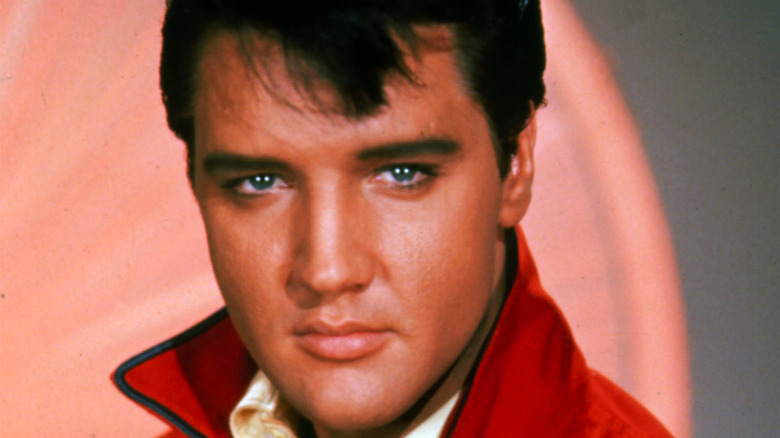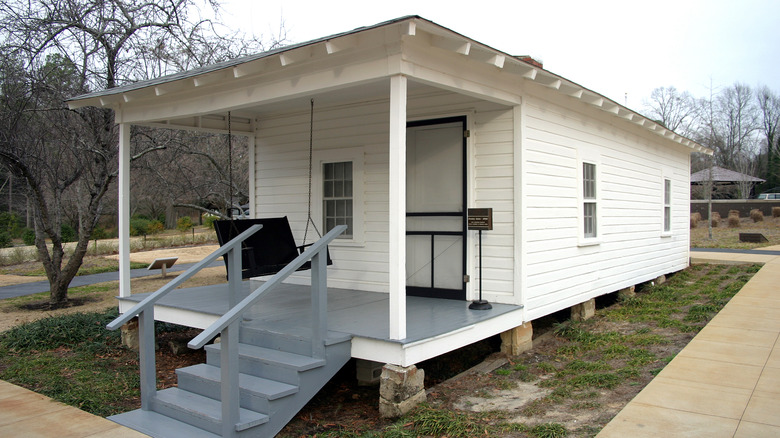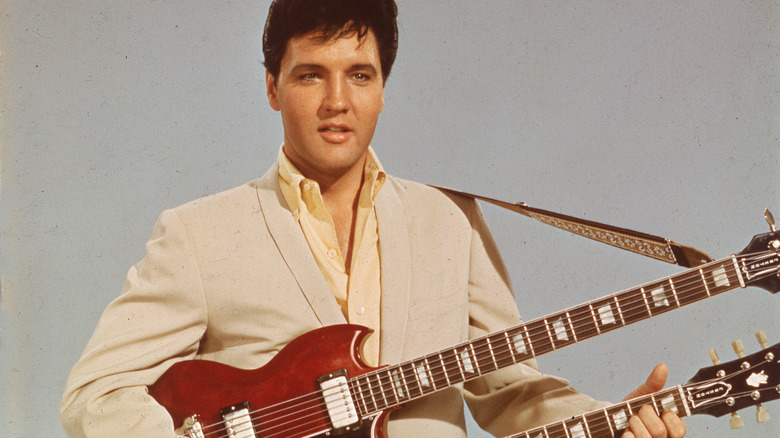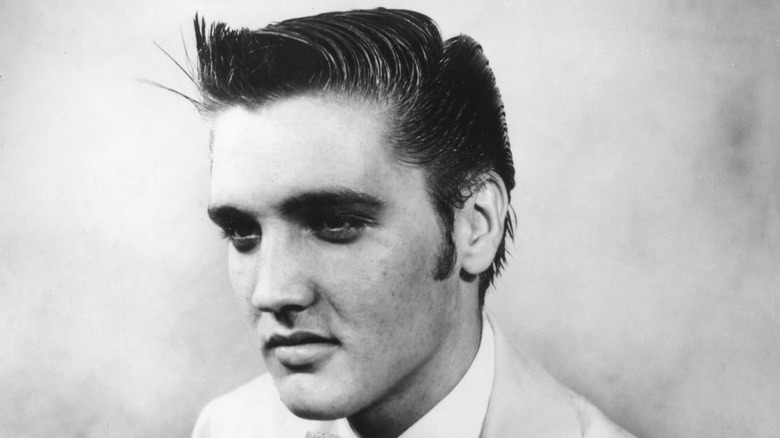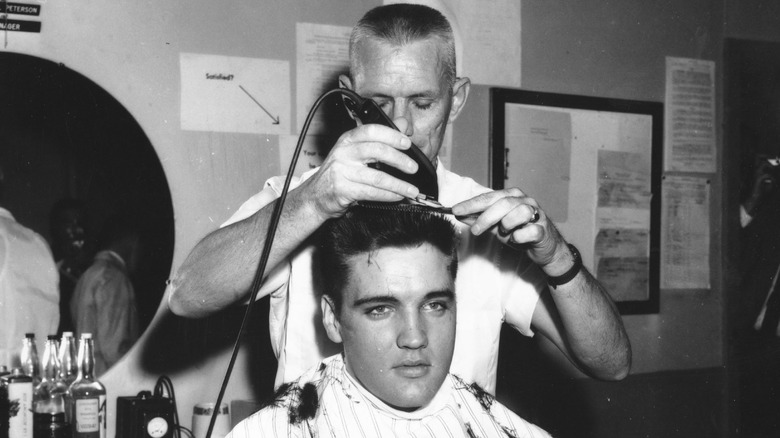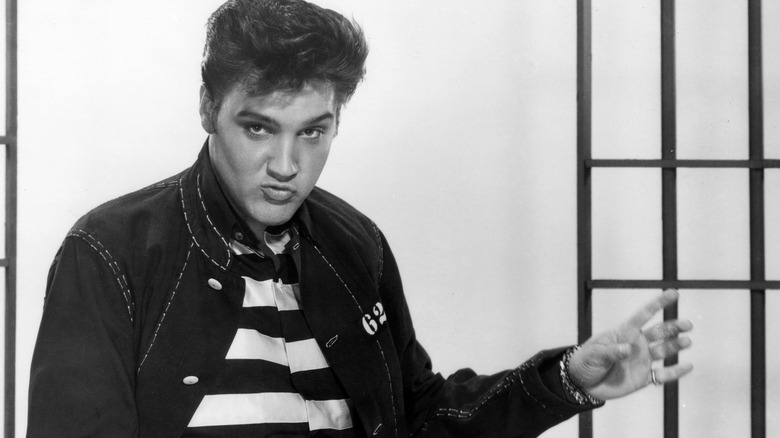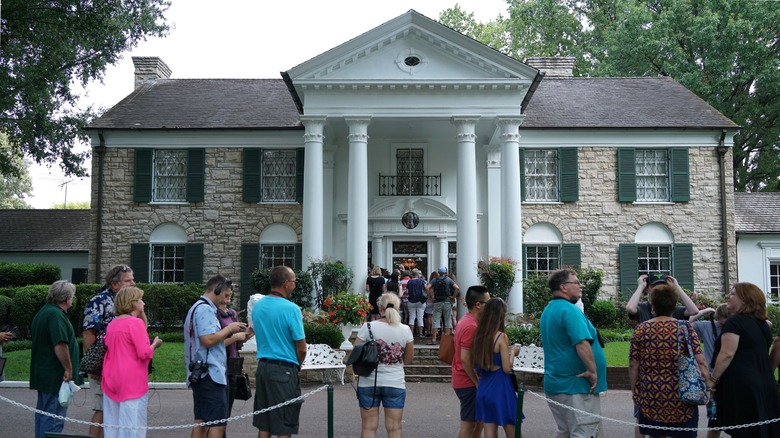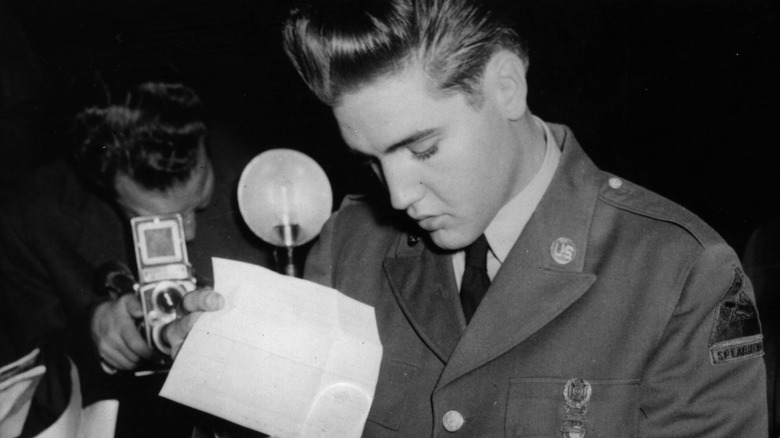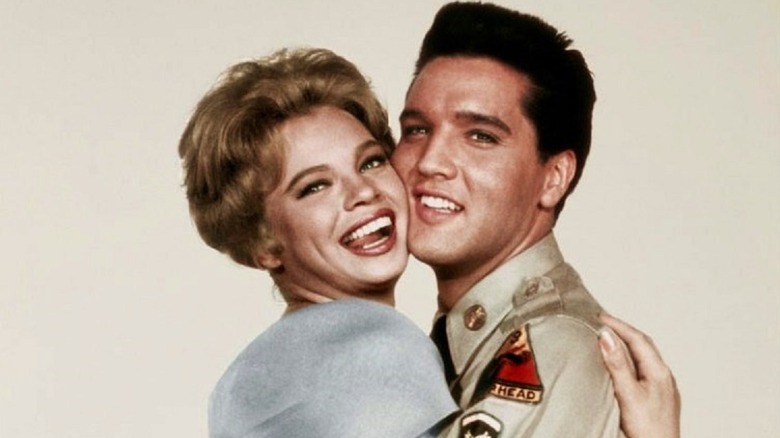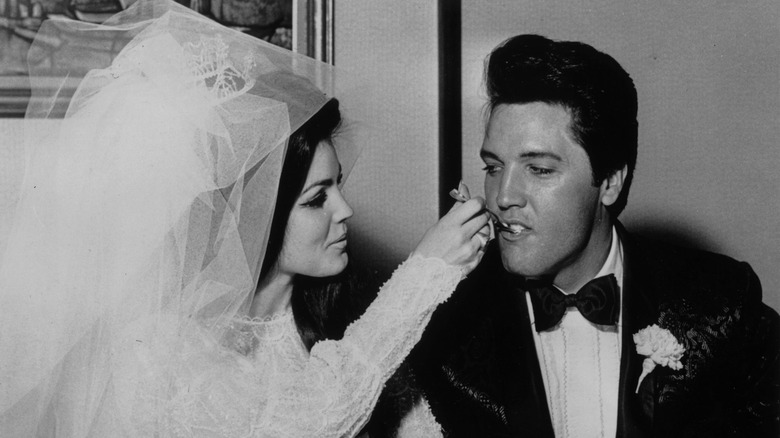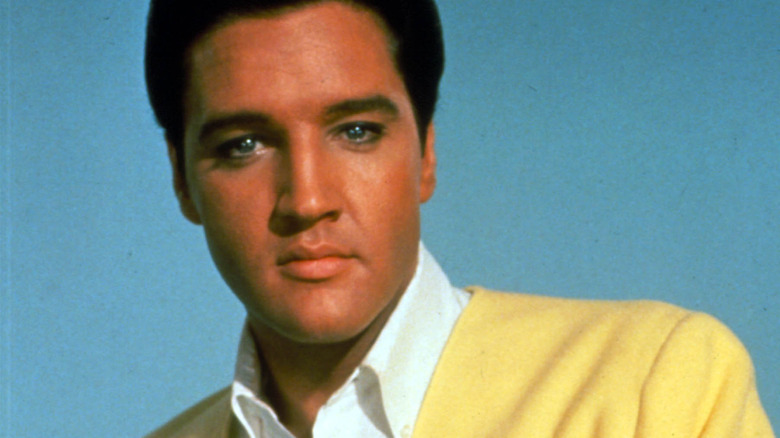How Elvis Presley Went From Truck Driver To Rock King
America has a complicated relationship with kings. The U.S. Constitution forbids them because of that time King George III incited a rebellion by asking for money. Then you have King Kong, who went bananas in Manhattan and kidnapped a woman. Perhaps the weirdest Yankee monarch was Michael Jackson, who cemented himself as both the king of pop and the emperor of unsettling immaturity. And of course, there's Elvis Presley, the rockingest king of them all.
Elvis had hips and hits to spare. He hounded dogs, broke hotels' hearts, shook up the music and movie industries, and made the world go away whenever he sang onstage. In the decades since his death, no rock and roll artist has managed to step on, let alone fill, Elvis' blue suede shoes. So it's only fitting to retrace his steps along the footpath to fame. Here's how the King claimed his throne.
Elvis's un-kingly upbringing
The King wasn't born with a crown on his head, partly because that's biologically impossible, but mostly because his parents couldn't afford one. Per the official Graceland website, Elvis was delivered in a two-room house (shown above) in Tupelo, Mississippi, on January, 8, 1935. His only sibling, a twin brother named Jessie, was stillborn.
Elvis grew up in a world withered by the Great Depression. As George Washington University detailed, "Forty percent of the farms in Mississippi were on the auction block on FDR's inauguration day" in 1933. Elvis' mother Gladys kept indigence at bay by working as a sewing machine operator. His father, Vernon, however, struggled to bring home the bacon, the bread, and every other tasty money metaphor. Rolling Stone explained that Papa Presley earned his bucks driving trucks but got busted for check fraud when Elvis was 3. From then on, his only steady job was looking for work, which he found sporadically.
The Presleys led an almost transient lifestyle, hopping between homes as they tried to weather the financial drought. In 1948 they moved into a public housing unit in Memphis, Tennessee. Money remained tight, but so did the family's bond. Elvis' parents used what little resources they had to give him everything they could. Elvis eagerly returned the favor, juggling jobs and school as a teenager to help keep the household afloat. Less than a decade later, he moved his parents into a mansion.
His love of music started early
In 1971, Elvis accepted an award for all-around awesomeness. During his speech, the King quoted a song to show how deeply music defined him: "I learned very early in life that: 'Without a song, the day would never end; without a song, a man ain't got a friend; without a song, the road would never bend — without a song.' So I keep singing a song." He wasn't lying. Elvis began belting out tunes as a boy and never stopped.
According to the Graceland website, long before he danced the jailhouse rock, Elvis was rocked by the house of worship. Church songs resonated with him, as did blues, gospel, and country singers. He also enjoyed putting his pipes to the test and partook in talent shows. At 10 years old, he took fifth place in a Mississippi talent competition. In fairness to Elvis, the talent show was aired over the radio, a medium immune to hip gyrations. Had it been televised, he surely would have won.
In 1946, Elvis got his first guitar. He actually wanted a bike (or a rifle, in some versions of the story), but given the family's finances, it was probably like asking for Fort Knox on wheels. Rather than pout like a petulant baby, Elvis embraced his gift and gained a reputation for playing it. During his down time he frequented the black neighborhoods of Memphis, which, according to Rolling Stone, boasted blues greats like B.B. King. Whether making or marveling at music, Elvis was seldom without a song.
Elvis was really shy as a kid
Whenever you see a performer of Elvis Presley's caliber, it's tempting to imagine that they always go about their day with style and confidence. That wailing baritone, those swinging hips, that wild footwork — you may think that must all belong to someone with an outgoing personality. But some of the most electrifying acts are put on by people who retreat into a shell when they aren't on stage, and Presley was one such act.
He was withdrawn from an early age. According to the Graceland website, the strongest impression Presley left on his classmates at Milam Junior High School was as a shy boy absorbed in his music. Talent didn't bring him confidence or win many friends. In fact, the local bullies sometimes targeted Presley's musicianship by cutting the strings of his guitar. The future heartthrob was no great shakes with the ladies in those days either. According to Mental Floss, Presley's prom date found him gentle but awkward. He stuttered and sweated his way through the night, and when it came time for the main event of prom, he apologized to his date that he — Elvis Presley — couldn't dance.
Time would address that problem, and becoming America's first rock 'n' roll sensation had to have given Presley's confidence some boost. Yet his longtime friend Joe Esposito told the Orlando Sentinel in 1999 that Presley remained shy as a man, a more down-to-earth and intelligent figure than his public persona let on.
The belated birthday present
In 1953, Elvis was just a guy trying to get by. He graduated high school that year and became a machinist. That summer, he discovered Sun Records. Per the Sun Records website, Elvis showed up not in search of a scepter, but to record a demo of the song "My Happiness" (above) as a "belated extra birthday present" for his mamma. He also voiced interest in singing professionally, but the man in charge wasn't in. So Elvis crooned a couple tunes and left the building.
Months passed, and Elvis entertained illusions of averageness. He took electrician courses and began driving a truck for Crown Electric. Thematically, he was in the right ballpark, but he was playing the wrong game. Elvis had the potential to electrify crowds and wear a musical crown, but he wanted to be king of the road. As Rolling Stone elaborated, Elvis fancied himself a future trucker and styled his hair into a pompadour like the truckers of his day. But in 1954 he shifted gears.
At the time, Sun Records owner Sam Phillips dreamed of joining black and white singing styles in musical matrimony. As author and rock historian Peter Guralnick recounted, Phillips believed blacks and whites shared "a spiritual connection." But to limit pushback from white America, his harbinger of harmony had to be white. When Elvis dropped by in '54 to record another demo, Phillips knew he'd struck gold.
Elvis dyed his hair black with shoe polish
There are a few key pieces to the Elvis Presley look, as any professional impersonator could tell you. Depending on the period of his career, leather jackets or sequin jumpsuits make up the wardrobe. There are the sideburns — of varying lengths. But consistent throughout his career was Presley's thick, jet black hair. Whether it was shaped into the pompadour that so many greasers emulated in the 1950s or the winged shag of his Las Vegas days, Presley's locks were stylish and dark. The style, once he hit the big time, was the work of hairdresser Larry Geller (per Yahoo! Life). The color was a matter of choice.
Presley was a natural blonde, according to Express. It darkened as he grew, but only to a light brown. But Presley felt that black hair would bring out his features better, particularly his big blue eyes, and his friends concurred. In the early days of his career, when cash was short and beauty products a luxury beyond most folks' means, Presley darkened his locks with shoe polish (according to Collider). Success, and the way he looked in front of a camera with black hair, reinforced Presley's belief, and he kept his head dark for the rest of his life except for a brief stint in the Army. Though, once he had some money coming in, he did switch the shoe polish out for proper hair dye.
The sun finally rises
The transition from trucking to rock king wasn't exactly easy. In 1954, Elvis was just a timid 19-year-old. According to Peter Guralnick, Sun Records owner Sam Phillips considered Elvis "one of the most introverted people who had ever come into the studio." During recording sessions the unrisen star sought constant reassurance and struggled to find his musical footing.
Even when Elvis got out of his own way, he continued hitting snags. As Rolling Stone recounted, numerous radio stations rejected him on racial grounds. Some suspected Elvis was a Black man singing country and blacklisted him. Others blew him off as a white bluesman. He was also hit-or-miss among listeners. Younger music fans flocked to him while fogies furrowed their brows with uncertainty or outright unease.
One demographic in particular treated Elvis like ear opium: women. Many found him sexy and went wild during his live performances. With his velvet voice, hypnotic hips, and luscious lips, Elvis was a one-man boy band, and boy did that help record sales. His soaring popularity with female fans helped land him a record deal with RCA in 1955. One year later, he came out with "Heartbreak Hotel," setting ears and loins alike on fire. The song rocketed to the top spot on the charts. Over the next several years he had 15 different Top 10 singles. By the early 1970s, Elvis had starred in over 30 movies and sold hundreds of millions of records.
He became known for his dance moves
A singer needs a distinctive voice, which Elvis Presley had. But if his skill in interpreting and performing tunes got him on the road to success, it was his dancing that launched him down it at high speed. According to PBS, it was the King's gyrations while performing "Hound Dog" for "The Milton Berle Show" that electrified teenaged fans across the country — and opened Presley up to attacks from critics and religious groups for the supposed "vulgarity" of his movements. The controversy followed Presley into his appearances with Steve Allen and Ed Sullivan, whose show operated on instructions to keep the cameras above those dangerous hips. Whether this was a concession to censors or a play for headlines by Presley's infamous manager, Colonel Tom Parker, is a matter of dispute for the historians.
Presley's wiggling legs and swinging hips bear a resemblance to the dance traditions in Baptist churches from which he drew (and always acknowledged) musical inspiration, per Far Out. But Presley's dancing didn't come from a preacher or a choreographer, and it wasn't a deliberate cultivation of moves on his own initiative: It came from nerves. Presley had such a bad case of stage fright in his first paid concert in 1954 that he couldn't help his legs shaking. He managed to make an asset of it, though at first he mistook the delighted screams of his audience for rejection.
Tasting Elvis
As Elvis ascended to stratospheric fame, something iconic happened under everyone's noses: the King touched tongues with a woman. Not just any woman, but a mystery mouth mate who would leave people pondering her identity for decades. Per Vanity Fair, photographer Alfred Wertheimer captured the famous facial exchange in 1956, but the image didn't capture any attention until Elvis passed away 21 years later.
Known simply as "The Kiss," the image has drawn comparisons to the timeless "V-J Day in Times Square," which features a sailor kissing a woman. In retrospect, that's an unfortunate association, since the sailor in question apparently snatched a random nurse and forced his face against hers. Also unfortunate is the fact that the Elvis kiss was acutely unromantic.
The woman who tasted the King's taste buds in 1956 was Barbara Gray (then named Barbara Satinoff). According to Gray, she drunkenly requested a one-day date with Elvis on a dare. She knew almost nothing about him, except that he was performing in her hometown of Charleston, South Carolina, and that he did black-sounding music. She didn't even enjoy his kind of music and found the King "insecure." Gray finally began to warm to him after he invited her to his concert, pawed her like a hound dog, and suavely called her "Fat Butt." Even so, she refused to kiss him, according to Vanity Fair. Elvis literally chased and cornered her before his concert.
The birth of Graceland
In 1957, Elvis was steeped in stardom. But amid the maelstrom of concerts and kisses, he never forgot his family. His parents meant the world to him, and now it was time to give them the moon. Per the History Channel, Elvis had already purchased his folks one home, but with everything they'd given him, he thought they deserved another. So the King procured a colonial mansion near Memphis called Graceland. He would reside there with his parents and his grandmother Minnie Mae "Dodger" Presley, who had been a constant presence in his life.
Over the years, Graceland became increasingly lavish. Per The Telegraph, Elvis installed a palatial den with a waterfall, a "Trophy Room" for awards and keepsakes, and other extravagant add-ons. One of Graceland's most memorable additions was a chimp named Scatter that, according to Animal Planet, drank bourbon, wore a chauffeur's uniform, and regularly accompanied Elvis on the road. Scatter also developed a taste "looking up women's skirts, pinching their butts, and climbing on them." When the impish chimp finally got too rowdy, he had to return to Graceland.
Five years after Elvis' death, Priscilla Presley turned Graceland into a tourist attraction. It became the second-most visited house in the nation. In 2017, Variety reported that Priscilla had opened a 450-room hotel across the street from her former home. Graceland has become a hunk of beloved history, a place where fans who loved Elvis from afar can feel close to him.
Elvis in the Army
Soon after acquiring Graceland, Elvis was drafted into the Army. Upon hearing the news, the public panicked. As the History Channel detailed, fans flooded the Army with thousands of letters imploring officials to un-draft Elvis. When that effort failed, the public campaigned to save the King's sable mane.
According to Time, fans had grown so invested in preserving Elvis's hair that state legislators tried to intervene on their behalf. Their aim was simple: to exempt Elvis from getting a buzz-cut. Initially, the Army balked at such a preposterous request. Elvis had already received a "hardship deferment" to finish filming a movie, and the military had no interest in giving him the rock star treatment. Elvis didn't want it, either. However, he did receive a light trim that "left him still looking much too dreamy for the Army."
Though Elvis' hair remained mostly intact, the rest of his life changed drastically. In 1958, his mother died. He had little time to grieve before shoving off to serve in a tank battalion in Friedberg, Germany. While there, he met 14-year-old Priscilla Beaulieu at a party. Age proved a minor concern for the 24-year-old Elvis, who became instantly smitten. The pair bonded over the next six months. Per People, Priscilla portrayed their relationship as somewhat restrained. The couple engaged in canoodling, but Elvis' nakedness was more emotional than physical. He mourned his mother's death, lamented his loneliness, and voiced fears that his fans had forgotten him.
The king of rock and reel
Contrary to Elvis' concerns, joining the military amplified his fame rather than muting it. The public praised him as a patriot, according to the History Channel, and countless Americans wanted to emulate him. Simply seeing Elvis get his polio shot on television helped nationwide vaccination rates jump from 2 percent to 85 percent by the end of his enlistment. And once Elvis returned to civilian life, Hollywood latched onto him like a lecherous chimp.
As the LA Times elaborated, between 1960 and 1969 Elvis made about three movies a year. Naturally, that unearthly work rate resulted in some cinematic stinkers. Uncomfortably titled creations like "Tickle Me" and "Kissin' Cousins" flopped ferociously. But Elvis also gained acclaim for features such as "G.I. Blues" (featured in the above publicity still), "Blue Hawaii," and other films that don't include cousin-lovin.' It was a mixed bag to say the least.
Musically, it was a lackluster time for Elvis. What little time he did have to make songs largely got devoted to soundtracks. Per Biography.com, this became particularly problematic toward the latter part of the '60s as the King's movie magic fizzled. Elvis had become a walking Warhol painting, a heaping helping of canned charisma. The prospect of continuing that way failed to whet his creative appetite. He wanted more serious roles. The King put it best during a 1969 press conference: "I want to change the type of script I've been doing." Instead, his whole life changed.
Life with Elvis was rocky
The '60s saw Elvis soullessly commodified by Hollywood, but that wasn't the King's sole concern. During that period he also deepened his relationship with the alarmingly young Priscilla Beaulieu. In 1963, she joined Elvis in Graceland. But as People pointed out, life with the rock star was often rocky.
Elvis lorded over Priscilla, dictating what she wore and how she walked. He forbade her from working and even controlled her hair color. Priscilla would later blame much of this despotism on Hollywood, telling The Guardian that Elvis' ideas on looks came mostly "from stylists and makeup artists" as well as the films he watched. Despite being at the mercy of a fashion tyrant, she married Elvis in 1967.
Marital bliss gave way to blistering rage as Elvis increasingly indulged his darker urges. When Priscilla strayed outside her marriage, Elvis, who was notoriously unfaithful, allegedly exacted revenge by "[forcing] himself on her." In an interview with ABC, Priscilla recalled her husband's harrowing habit of shooting the television screen whenever a broadcast upset him. Just how many TVs Elvis murdered is unclear, but any number greater than zero seems excessive.
The arrival of daughter Lisa Marie completely upended Elvis and Priscilla's marriage. The King no longer desired his queen romantically. He got hooked on pills and used touring as an escape from home life. Elvis had gone from an insecure introvert to an increasingly unstable cultural icon. His marriage collapsed, culminating in a 1973 divorce.
If you or anyone you know has been a victim of sexual assault, help is available. Visit the Rape, Abuse & Incest National Network website or contact RAINN's National Helpline at 1-800-656-HOPE (4673).
Elvis reclaims his crown
Before the divorce, in fact just a year after marrying Priscilla, Elvis had a musical revival. A marathon of movie roles had stunted him musically. To reassert his dominance, he put on an epic televised performance popularly known as "The '68 Comeback Special." Officially titled "Elvis," the NBC-sponsored concert showcased the King at his best. The Elvis of old took the stage with a vengeance. Dressed in black leather and sporting his trademark snarl, the King sang fearlessly, passionately, and powerfully. As Rolling Stone put it, the special "proved that the then–33-year-old still had swagger," despite years of being watered down in Hollywood. And it only took him 60 minutes to do it.
Writer and musician Robert Warren praised the show for its inspired music and messaging. Elvis paid homage to his musical roots, playing blues, rockabilly, R&B, and gospel. As an avid supporter of Martin Luther King Jr. and Robert Kennedy (both of whom had been assassinated that year), he also used his concert to promote racial togetherness. It was more than a show; it was a canvas for Elvis to paint a masterful self-portrait.
A series of global hits emerged from the performance. Up to that point, the Beatles and the Rolling Stones had overtaken the airwaves. But Elvis swiftly surpassed them with singles like "Suspicious Minds," which ousted the Beatles' "Come Together" from the top spot in the U.S. The King hadn't lost his crown; he had simply let other singers borrow it.
What happens in Vegas ...
The '68 Comeback Special rejuvenated Elvis's career for far longer than an hour. Once again white-hot, Elvis struck a deal to perform at the International Hotel in Las Vegas (which later became the Westgate Las Vegas Resort) in 1969. His shows sold out for 837 straight nights over a period of seven years. Sadly, the King's renewed rise was also his downfall.
The good times rolled, but the King grew roly-poly. As Billboard bluntly asserted, "Elvis set a whole new standard of debauchery." He lived for pills and thrills and ate abominably. As Elvis became increasingly unhealthy, he made repeated attempts at crash dieting that inevitably crashed and burned. The onetime hunk of burning love burned the candle at both ends, and it was only a matter of time before his flame went out.
Perhaps Elvis simply believed it was time to go. According to an ex-Radio City Rockette, "Elvis was superstitious. He had this premonition that he was going to pass away in his 40s, the same age as his mom." Whether he saw the future or simply willed it, he was right. In June 1977, he gave his last live performance as a favor to his manager. "Can't Help Falling in Love" was his final song. On August, 16, 1977, the star America had fallen in love with died. His heart succumbed to years of stress and chronic drug use. But although Elvis's candle had extinguished, fans never stopped seeing its light.
